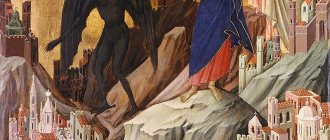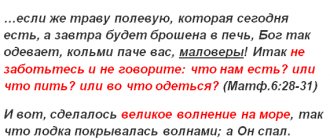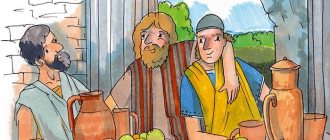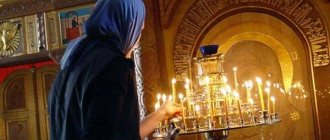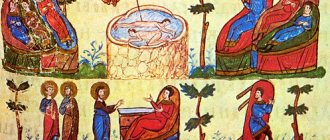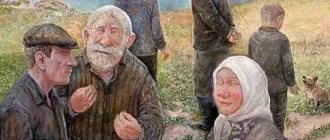One of the parables of Jesus Christ, given in the Gospels of Matthew, Mark and Luke, tells about evil winegrowers. As presented by all three authors, it sounds almost identical, with only minor differences in details. Jesus Christ told this parable in the temple, being there the day after His triumphant entry into Jerusalem. Let us remember its text, because it contains a deep meaning that has not lost its relevance today.
A parable that has survived time
The parable of the winegrowers says that a certain owner, having planted a vineyard, took care to surround it with a fence, erect a tower and build a winepress - a reservoir for obtaining grape juice. Having entrusted further work to his workers ─ winegrowers, he retired. When the time came to harvest the harvest, the owner sent servants to the vineyard to bring him the fruits of the labors of his workers.
But the winegrowers, according to Jesus, stoned them and drove them out in disgrace. The owner tried to send other servants, but the same story repeated with them. Finally, he sent his beloved son to the vineyard, hoping that they would be ashamed of him and act properly. However, instead, the evil winegrowers killed him, hoping that, having dealt with the heir, they themselves would become the owners of the vineyard.
Having completed the parable of the evil husbandmen, Jesus asked a question to the crowd gathered around Him, among whom were the high priests and elders. He asked what, in their opinion, the owner would do with these workers, and received the answer that he would put the villains to a cruel death, and would entrust the care of the vineyard to his more worthy servants.
Orthodox Life
Sermon by the rector of the Kyiv Theological Academy and Seminary, Bishop Sylvester of Belogorodsk, on the 13th Sunday after Pentecost.
In the name of the Father, and the Son and the Holy Spirit!
In today's Gospel passage, the parable of the evil winegrowers was read.
When interpreting this parable, it is important to indicate the time of its utterance - this is Passion Week. That is, the Lord Jesus Christ delivered this teaching in the last days of His earthly life. And the meaning of the parable takes on special specificity taking this into account.
So, the parable says: “There was a certain owner of a house who planted a vineyard, surrounded it with a fence, dug a winepress in it, built a tower, and, having given it to vinedressers, went away” (Matthew 21:33).
The very image of the vineyard has symbolic meaning in the sacred history of Israel. The psalmist exclaims: “You brought the vine out of Egypt, drove out the nations, and planted it” (Ps. 79:9). The great prophet Isaiah directly calls Israel the vineyard of God: “The vineyard of the Lord of hosts is the house of Israel” (Is. 5:7).
Thus, using the image of a vineyard, Christ immediately makes his listeners understand the meaning of this image. Therefore, it was quite clear to the listeners of this parable that the vineyard is Israel, and the owner and organizer of the vineyard is God Himself.
St. John Chrysostom, explaining the parable, says that all the work done by the owner for the vineyard “surrounded it with a fence, dug a winepress in it, built a tower” (Matthew 21.33) should be understood as the giving of the Law to the Jews, and the construction of the Old Testament temple. Having left, the owner of the vineyard entrusts the care of it to the winegrowers.
First of all, it should be noted that the absence of the owner of the vineyard should not be understood as the absence of God or His care. Blessed Jerome already protests against such an opinion and says: “This is not a matter of changing place, for God, with whom everything is filled, how can he not be present somewhere? But He seems to be moving away from the vineyard in order to give the winemakers complete freedom in their work.”
The winegrowers have complete freedom of action, which the owner gave them. What is hidden under this image? Of course, if under the owner of the vineyard we see God, under the vineyard we see the Jewish people, then under the vinedressers we clearly recognize the teachers of the people of Israel; priests, scribes and Pharisees.
It is they who are given freedom of action in the vineyard entrusted to them. Why is that? Because a person, his nature, his attitude, his responsibility or, conversely, irresponsibility are fully revealed when he is given freedom of action. Life experience is the main proof of this statement. We all know that a person will be tested precisely when he is free, and even more so when this freedom is accompanied by powers and authority. God allows the teachers of Israel to operate unhindered for the reason that ultimately they must all fully reveal themselves and show what they really are. Such is the wisdom of God, and such is the great gift of freedom.
Caring for grapes is a very complex process that requires a lot of attention and skill. And the very image of tending God’s vineyard reveals the secret of salvation. God Almighty. By His word the heavens and earth were created, and by His word miracles were immediately performed. But in the matter of salvation everything is different. Salvation is a huge undertaking. God, like a loving parent or a caring husbandman, grows a person to accept salvation. The love and care of parents always manifests itself in meticulous, slow, loving parenting. Getting up to see the child at night, teaching him in a querulous manner even when the child is not diligent in his studies, wisdom and long-suffering towards the child in difficult adolescence - all this characterizes a loving father and mother. This image will help us, along with other evangelical and patristic images, to understand how much God is the father and teacher in our salvation. Unhurried, attentive, loving and patient.
As in raising a child, so in cultivating whimsical grapes, there are always helpers: educators, teachers, coaches, tutors and other mentors. It goes without saying that these assistants are expected to be completely responsible and pious. But, alas, this does not always happen. So in this parable, God the vinedresser entrusts his inheritance, Israel the vineyard, to his helper vinedressers. But left to their own devices, these helpers reveal themselves as evil natures.
The vineyard is planted and arranged. Harvest time is approaching, and the owner of the vineyard wants to collect the fruit. To do this, he sends his other servants to the winegrowers, but they not only do not give the ripened grapes - they beat and drive out those sent. What happened? The winegrowers usurped the owner’s property and appropriated it for themselves. They imagined that they were not caretakers and managers, but the owners themselves. A very bright and understandable image is given in this parable. Israel's teachers are usurpers. And like all usurpers, they are, as they say, temporary workers. They do what they want, for nothing and they are not answerable to anyone. They have one law - themselves.
This behavior of evil winegrowers and their rebellion against the rightful owner of the vineyard makes them akin to another usurper - the prince of this world, Satan. The devil is also a usurper, imagining that he is the ruler of the world. However, according to the teaching of the holy fathers, the devil in no way belongs to the earth and everything that is created by God. The devil only wants to steal what belongs to the Lord. And yet, for some time, there are many people who accepted the satanic teaching and submitted to the devil. These same people who accepted the covenants of the devil form, as it were, a kind of world, the prince of which is the devil. The teachers of Israel, whom we recognize as the evil vinedressers, are not just usurpers of God's heritage, they accept and share a certain satanic worldview that makes them haters of God and His Son. The Lord Jesus Christ Himself, denouncing His enemies who want to destroy Him, directly tells them: “Your father is the devil; and you want to do the lusts of your father” (John 8:44).
All Scripture of the Old Testament is a story about the constant falling away of the Jewish people from the Law of God. And then the Lord sent prophets who revealed the will of God and called for repentance. The Old Testament prophets cried out all the time: Israel! Repent, otherwise there will be ruin!
And what do the rulers and teachers of Israel do with the prophets - these servants of God? The parable gives the answer: “some they beat, some they killed, and some they stoned” (Matthew 21:34).
But the Lord sends even more servants, i.e. even more prophets. These prophets constantly tell the Jews about the need to repent and live according to the Law of God, but they are still rejected and killed. And ultimately, the Lord sends His Only Begotten Son, in the hope that the evil vinedressers will be ashamed of him. God the Father does absolutely everything to call the evil winegrowers to repentance - even to the point of sending his son.
We will understand the meaning of this expression if we take into account the tradition that existed in the East of entrusting special important matters, including missions, to the heir, the son. It is as if the status of the messenger is increased and thereby illustrates the importance and determination of the Sender.
Killing a status envoy is a radical measure, indicating a complete break and war. The parable uses the image of the messenger son to emphasize: patience has reached its limit, and all possible boundaries have been violated.
However, the evil winegrowers are no longer afraid of anything and therefore decide to kill. Scripture conveys their attitude with these lines: “this is the heir; let’s go, kill him and take possession of his inheritance” (Matthew 21.37).
The villains hope that after this the owner of the vineyard will never send anyone again, and he himself will no longer want to work on the vineyard. This means that thieves will be able to own what they have appropriated absolutely unhindered and for a long time.
The parable itself is at the same time a prophecy that the Son of God Jesus Christ will be killed by evil winegrowers, i.e. those who were appointed to shepherd the people of Israel - the scribes, the teachers of the people, the Pharisees, the priests. With this parable, the Lord not only denounces the Pharisees and scribes, but also predicts His imminent death on the cross outside the walls of the holy city of Jerusalem (cf. Heb. 13:12). The Lord Jesus Christ himself, at the end of this parable, asks what the owner will do with these evildoers when he comes (Matthew 21:40), and the listeners answer: “He will put these evildoers to an evil death, and will give the vineyard to other winegrowers, who will give it to him.” fruits in their season” (Matthew 21:41).
Here is an indication of the future fate of Israel: the grace of God will be taken away from the Jewish people and will be transferred to the nations who believed in Christ. The New Testament reveals a new Israel, a new chosen people. These are all those who believe in the Lord Jesus Christ and belong to the holy catholic and apostolic Church. This is God’s new chosen people, on whom God’s grace rests, taken away from the ancient Jews because they not only did not fulfill the commandments of God, but did not accept Christ and ultimately killed Him.
Then the Lord says: “Have you never read in Scripture: the stone that the builders rejected has become the head of the corner? Is this from the Lord, and is it marvelous in our eyes?” (Matt. 21, 42). By stone, of course, He means Himself. The Apostle Peter in his conciliar letter directly says that the stone that was rejected and which was placed at the head of the corner is Christ (1 Pet. 2:6-8). Faith in Christ is the rock and foundation for a godly life. The Jews rejected Christ, but piety has existed in the world since those times due to the fact that Jesus Christ is the stone, the foundation of our salvation. And no one, says the holy Apostle Paul, “can lay any other foundation than that which is laid, which is Jesus Christ” (1 Cor. 3:11). Some, like the evil vinedressers, reject this stone of salvation and perish. Others accept and build on Him (cf. 1 Cor. 3), for our Lord and Savior Jesus Christ is the foundation, the door, the way, the beginning and the end, the meaning and purpose of human life, to Him be glory forever and ever! Amen!
Interpretation of the images of the owner, vineyard and fence
Many Christian theologians and holy fathers of the church devoted their works to the interpretation of the above parable of the winegrowers. Based on their work, it became a tradition to endow the images used in it with meanings, disclosed below.
By the owner of the vineyard, Jesus means God ─ the Creator of the world and everything in it. The Vineyard is nothing other than the Jewish people themselves, who are entrusted with preserving the faith. Subsequently, the image of a bunch of grapes or a vine was firmly established in Christian symbolism, becoming the personification of the community of people who made up the earthly Church of the Lord.
The fence is the Law of God, received by the chosen people through Moses. At the very beginning of the forty-year wandering in the desert, the Lord on Mount Sinai communicated to His prophet, who led the exodus of the Jews from Egypt, a set of instructions concerning religious and social life.
Image of a winepress, tower and vinedressers
The winepress is the altar, and the grape juice is the blood shed on it. The ancient Jews traditionally sacrificed various animals and birds, the blood of which was believed to help cleanse people from their sins. In this case, interpreters of the parable see a prophetic prediction about the blood shed by Jesus Himself on the cross.
The tower is nothing more than a temple built in Jerusalem. At the time when Jesus spoke the parable of the vinedressers, the Second Temple stood in the capital of the Jewish state, the construction of which began in the period following the return of the Jews from Babylonian captivity (516 BC), and ended only two decades before Christmas Christ's. The first temple was built by King Solomon in 950 BC. e. Its destruction in 598 BC. e. marked the beginning of the Babylonian captivity of the Jews, which lasted almost 60 years.
By vinedressers Christ means the high priests and all the elders of the Jewish people. It is to them that He addresses His diatribe. On the pages of the Gospel they are called scribes and Pharisees and are characterized as people who, although they had knowledge of the Law of Moses, but for the sake of their own interests reduced serving God only to the formal fulfillment of instructions, while ignoring the essence of the teaching. Subsequently, the word “pharisaism” became a common noun, meaning hypocrisy and hypocrisy.
The symbolic meaning of the absence of the master, his servants and fruits
The absence of the owner, according to interpreters, is the time that has passed since the Lord led His chosen people out of Egyptian slavery. According to the Holy Scriptures, this historical event dates back to approximately 1400 BC. e. Consequently, in the parable the Lord means a period covering almost one and a half millennia.
The servants sent to the vinedressers are prophets, who, as we know, were persecuted by the high priests or killed. Throughout their history, the Jewish people and their rulers repeatedly retreated from the fulfillment of the Law given to them by God, and even fell into paganism more than once. In these cases, the Lord singled out from among them the most worthy people (prophets), through whose mouths he denounced the iniquities being committed. Many of them were killed or suffered various persecutions.
The fruits that the owner expected to receive from his workers are the spiritual growth of the people and their knowledge of God. Coming out of Egyptian captivity, the people of Israel were full of remnants of paganism, and the duty of the priests was to educate them in the spirit of the Laws of Moses.
What should you do to inherit eternal life?
(Matthew 19:16) And behold, someone came and said to Him: Good Teacher! What good thing can I do to have eternal life?
Here we are talking about a young man who was rich and did not want to leave his wealth for Jesus’ sake. Peter asks Jesus:
(Matthew 19:27) Then Peter answered and said to Him: Behold, we have left everything and followed You; what will happen to us?
The Lord then answers Peter:
(Matthew 19:28-29) Jesus said to them, “Truly I say to you, that you who have followed Me, in the future, when the Son of Man sits on the throne of His glory, you also will sit on twelve thrones, judging the twelve tribes of Israel. And whoever leaves houses, or brothers, or sisters, or father, or mother, or wife, or children, or lands, for My name’s sake, will receive a hundredfold and will inherit eternal life.
The word "everyone" clearly refers to us. “Leave” does not mean divorce or anything else. This means that priority must be set.
The image of the owner's son, his murder and subsequent retribution
By son and heir, Jesus undoubtedly means Himself, sent by the heavenly Father to save people. One of the fundamental dogmas of Christianity is the doctrine of the Holy Trinity, representing three hypostases of the One Divinity. In it, God the Father, God the Son and God the Holy Spirit were united inseparably and inseparably. The embodiment of the second hypostasis is Jesus Christ.
The murder of his son is a prophecy of His own future execution on the cross, which He had to endure as a redemption for all the people of the world who were stricken by original sin and, as a result, doomed to eternal death.
The arrival of the owner himself is interpreted as the Second Coming of Christ, when each person will be rewarded according to his deeds. On this day, the archangels of God will sound the trumpet and call people to the Last Judgment of the Heavenly Father.
In the Bible, the word “parable” is translated as a short saying that expresses a rule of life
In the Bible, the word “parable” is translated as a short saying that expresses a rule of life. These were, for example, the parables of Solomon. The parables of Solomon are wisdom, which is presented as everyday advice, justified by the will of the one God.
The parables of King Solomon were very different from the parables of Jesus Christ. Photo: fb.ru
What can be said about the parables that Jesus Christ speaks? The interpretations that Jesus gives to his parables speak more about the heavenly, true and spiritual life. But Solomon's parables are more addressed to everyday and everyday practice.
The meaning of the parable of the vinedressers
As mentioned above, many theologians devoted their works to this gospel story. From the interpretation of the images given in the parable of the evil winegrowers, it becomes clear that in his words Jesus Christ denounced the high priests, elders, and all those who had been entrusted by God with the care of preserving and increasing the faith. Presenting their own words as the will of God allegedly revealed to them, these people beat and killed the prophets sent by the Lord to admonish them. Having done their dirty deed, they planned reprisals against the Son of God Himself.
It is characteristic that, having heard from the lips of Jesus the parable of the vinedressers, the priests and elders who were present understood its meaning, and nevertheless involuntarily exposed themselves with exclamations that the workers to whom the vineyard was entrusted are evildoers. Thus, they pronounced a sentence on themselves, speaking about the inevitable retribution that the Lord would bring down on them.
Let us note that most interpretations of the parable of the evil vinedressers indicate that, speaking of the wrath that the owner will bring down on his evil workers, Jesus allegorically predicts the destruction of Jerusalem, committed in 70 by Roman troops, and the innumerable misfortunes of the Jewish people that resulted from it.
Many are called, but few are chosen
All these workers are called, but few are chosen. Whom does God choose?
God chooses those who trust Him and give the opportunity to show His heart in goodness. Who trusted more in His goodness? Those who worked in the morning or the one who came at the end? Those who came at 9 am? They thought they would get more because they had done more. Some have more grace, and those who have worked to earn salvation by their works have less grace. Therefore, the Lord says that many are called, but few are chosen.
Important! The owner of the vineyard himself came out to the workers. The Lord himself comes out to everyone.
(Matthew 20:4) And whatever follows I will give you.
This was said to a group of workers who were standing in the marketplace at 9 am.
(Matthew 20:7) And whatever follows, you will receive.
“Receive” is said to the last workers.
“I will give you” and “Receive” there is a difference. It is one thing for God to give, another for us to receive. The end-time generation will receive. God told Israel: “A land flowing with milk and honey will I give you.” But they didn't take it. It is possible that God gives blessings, but we do not accept. Those who accept fullness have the most grace.
It is necessary to see God as a giver, providing all the time. You can't refuse.
Sermons on the Feast of Pentecost
Like all other passages from the Gospel, this parable is heard during services, and then explained from the church pulpit. According to the tradition established many centuries ago, it is customary to read a sermon about evil winegrowers on the 13th Sunday after Pentecost.
To avoid any errors in understanding this dating, we note that in the Church Slavonic language the word “week” does not denote the seven-day period from Monday to Sunday (it is called “week”), but only Sunday. It is the seventh in a row, and its ordinal number, as is known, is not divisible by anything except itself or one. This is where the word “week” comes from. Therefore, it should be understood that the sermon about evil winegrowers is heard from church pulpits on the 13th Sunday after Trinity - a holiday also called Pentecost.
Birth of the Church of Christ
The holiday was established in honor of the descent of the Holy Spirit on the apostles on the fiftieth day after the Resurrection of Jesus Christ. Since this event is traditionally considered the birth of the Church of Christ on earth, it is important for all its members on this day to once again think about the meaning of the parable of the evil winegrowers.
Paintings and engravings created on this subject by various artists help to more clearly imagine what Jesus Christ told within the walls of the temple the day after His Entry into Jerusalem. Some of them are presented in our article.

